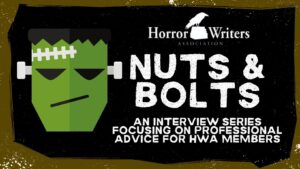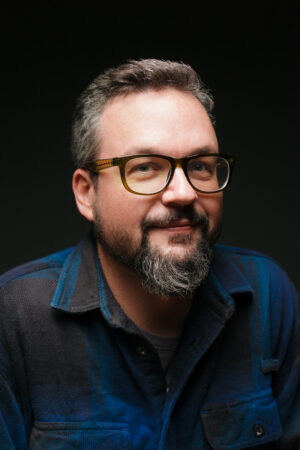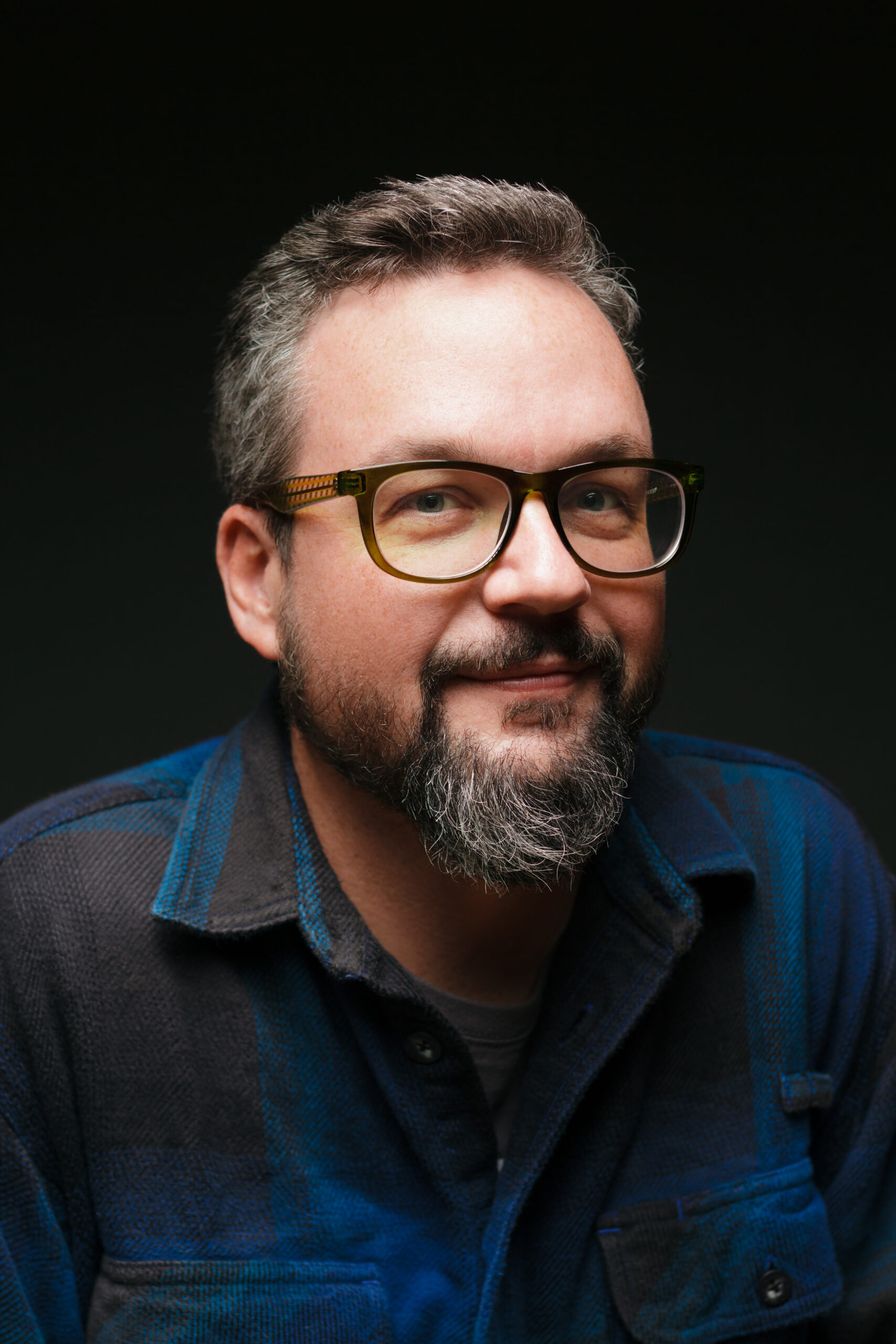 By Tom Joyce —
By Tom Joyce —
Jeffrey Cranor, co-creator of the “Welcome to Night Vale” podcast, has good news for horror writers. You’re already the world’s leading authority on what it takes to write effective horror – a knowledge of what scares you.
Jeffrey should know. He created his supernatural fiction podcast with Joseph Fink in 2012, featuring a small-town radio host deadpanning his way through banal local news reports, interspersed with casual references to the outlandish conspiracies and otherworldly terrors that are part of the daily routine for Night Vale’s beleaguered residents.
A year later, “Welcome to Night Vale” was the most-downloaded podcast on iTunes. “Vulture” has since described it as “the foundational institution of the fiction-podcast genre,” and it’s spawned novels, albums, and live stage shows. Jeffrey and Joseph have appeared on “Late Night With Stephen Colbert.” And it’s still going strong.
In this month’s edition of Nuts & Bolts, Jeffrey discusses topics including why diversity makes good business sense, tips on starting a podcast, and tapping into your own fears to produce great horror fiction.
Q: Do you have any advice for writers interested in starting a podcast?
A: Sure! This isn’t everything you need to know, but I think these are the essential points for your mindset in going into a new podcast.
- Start with the people you want to work with. A podcast isn’t a book or a play. It’s not a one-off endeavor. You’re going to be making this show for while (hopefully!), and you want your collaborators to be people you like collaborating with.
- Pick a show idea that you all are excited to make. Whether that’s narrative non-fiction, a talk show, or fiction story-telling, you want something that inspires each of you to put the work in. And again, it’s going to be a show format you’re stuck with. So you want something you’ll be thrilled to make five weeks from now or five years from now.
- Find your unique angle to your show. Just because there are a bunch of podcasts who already do the thing you want to do doesn’t mean there’s not room for your show too. When Cecil Baldwin and I started “Random Horror 9,” we knew there were a bunch of horror movie chat shows, but we didn’t see any that were doing a random draw of each film. And none that approached horror movies from the POV of the horror-squeamish.
- Finally, do a test episode. Put it all together. Does it sound right to everyone? Is the workload doable for your weekly/monthly/etc. show? Is it doable for each person? You’re going to repeat this process over and over again, so make sure you all can handle the workload.
Q: How do you balance the elements of horror and comedy, while still telling a grounded, coherent story?
A: I often use the two words Levity and Gravity to frame my writing. Gravity is the dominant force here on earth. Levity can always be achieved for a time, sometimes a long time. But remember that gravity is always there. Levity and gravity aren’t quite the same as horror and comedy, but the question you have to ask yourself is “what is my gravity?” Or, what grounds your piece?
For me, the reality of the characters is always the gravity. Even in a comedy like “The Cabin in the Woods,” the characters always have something at stake, something we care about. And the empathy we feel is the gravity. The levity of “The Cabin in the Woods” is the meta humor. It’s the extreme violence. It’s the high-concept plot. Those things float above the surface, but the gravity keeps them from drifting away.
If you’re writing a horror story with comedic elements (e.g. “Drag Me to Hell,” “Weapons,” “Scream”), the life-or-death stakes of the characters (their safety) is the gravity of your tale. And the comedic elements are the levity … things like one-liners, irony, maybe even absurdity to break tension or color the mood.
If you’re making a comedy with horror elements (e.g. “The Monkey,” “Scary Movie,” “Tucker and Dale Vs. Evil”), the comedy is actually your gravity and the horrors are the levity. You must serve the jokes, the laughs, and the fun first.
In the case of my podcast “Welcome to Night Vale,” we’re using horror elements and comedy elements, both, as levity against the gravity of an ongoing episodic narrative of the people in the town. Each character has simple wants and needs. Sometimes their journey is scary. Sometimes it’s funny. Sometimes both. But we write Night Vale with sympathy for the characters in mind. Every choice they make has consequences, and we want those consequences to be compelling and believable first and foremost. Then, we can add on the wilder elements.
Q: What can you tell us about building and maintaining a following?
A: I can’t tell you much about building a following. We developed a huge audience for “Welcome to Night Vale” without doing much in the way of marketing. We had a social media presence on Twitter (back when that was a fun thing to do), and that certainly helped. In fact, I think social media is required if you want to have any audience these days. So choose a platform you’re comfortable with.
Also, think carefully about representation. From an altruistic standpoint, that’s obvious. Duh. But it’s also just smart business. Racial and gender diversity will not alienate a single self-respecting member of your audience. In fact, it will only alienate the people you don’t want engaging with your work.
Whereas having a homogenous cast or set of hosts can be alienating to people who don’t feel like your show speaks to them, especially if it veers toward the insensitive/ignorant. Grow your audience by featuring a broader set of voices that your audience can connect to.
Maybe this is just casting diversely. Better yet, having writers/hosts/directors/editors who are different than you.
When Night Vale launched in 2012, we received a lot of feedback from fans that they really connected to a centralized and normalized gay romance. And if you go back to 2012, you will find there were not many of these narratives happening in the media. WE didn’t write gay characters to win a gay audience, we just thought non-tragic/non-villainous/non-sidekick gay characters were way more interesting because it wasn’t done very often.
Diversity isn’t just a liberal ideal, it’s also way more interesting. And, as it turns out, smart business.
Q: How do you keep a franchise fresh over such a long time?
A: See my answers for tips on starting a podcast. My co-creator of “Welcome to Night Vale,” Joseph Fink, and I made the show we thought would be really, really fun. And we were right.
Additionally, we decided it would not be an epic that required a huge ongoing plot and big ending. We also didn’t want it to be purely episodic (like a Simpsons episode) where the timeline resets every episode.
We chose ongoing continuity. While each episode might be a standalone story, the characters are all aging and changing in real time. Is someone breaks a hand, they’ll be in a cast for a while. If the Librarians escape the Library, then they’re on the loose in town until we say otherwise.
So while the basic structure of each episode stays the same, we’re always thinking about how these characters are growing up. It helps us stay interested in the world, and hopefully our listeners, too.
Q: A signature element of Night Vale is the mind-boggling number of off-hand references to horrific and uncanny phenomena. Do you have advice for horror writers about coming up with ideas and imagery?
A: Think about what scares/excites you. It’s this love/fascination that will help you write in a way that will also frighten your reader/listener. You’re the expert on your own fears, and when you’ve spent a lot of time thinking about certain images, you’ll be better equipped to write those images.
Also, be familiar with the horror genre and all the tropes and trends. Zombies and Psycho Killers and all that are pretty basic, but they’re tried and true. So when you enter those familiar areas, find something new to explore with them.
In Night Vale, we tend to play in the absurd, finding Jungian/Lynchian imagery, and keeping things fresh that way. But when we get into the archetypes of ghosts or madmen or monsters, we try to subvert it. We usually do that for humor, but subversion of expectations is important in horror (all writing really).
Q: You’ve been involved with many different forms of storytelling – podcasting, live theater, novels. What media do you think are promising right now for horror authors looking to build a following?
A: Man, that’s tough. You have to use social media, no matter what. So pick the one you’re most comfortable with. Promote your work, yes, but also be in conversation constantly. Make content. If you’re a horror writer, maybe talk about horror movies. Or do videos about your favorite special effects. Or create super short scary stories.
TikTok has been where I’ve been discovering new artists these days, so maybe that’s it. Though Insta has a pretty consistent and broad audience. Just find the place you feel you can make the best posts at the highest rate.
Q: Do you have any upcoming projects you’d like us to know about?
A: Listen to “Welcome to Night Vale,” y’all. If you’ve never heard it, you can start anywhere, really. But you might as well start at episode 1. And if you haven’t listened in a while, jump back in. I think we’re still writing fun fun stories.
Also, I do a horror movie podcast with Cecil Baldwin called Random Number Generator Horror Podcast No. 9. We do a movie a week selected at random from dice rolls. It’s been so fun to make, and we really focus on things like horror writing, tropes, subgenres, acting, etc. It’s not strictly about trivia or qualitative ratings. It’s just about the experience of each film.
 |
Jeffrey Cranor
|
NOTE: I’d like to thank Bob Trate, director of programming for the Colonial Theatre in Phoenixville, Pa., for his help in making this interview happen. Learn more about the Colonial Theatre (shooting site and home of the Steve McQueen classic “The Blob”) here: TheColonialTheatre.com/
Tom Joyce writes a monthly series called Nuts & Bolts for the Horror Writers Association’s blog, featuring interviews about the craft and business of writing. Please contact Tom at TomJHWA@gmail.com if you have suggestions for future interviews.


